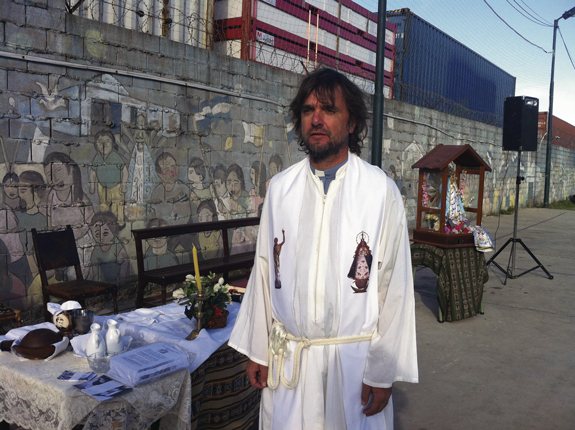by David Agren

BUENOS AIRES, Argentina (CNS) – Lawyer Diego Morales often walks past the Metropolitan Cathedral in this South American capital. He recently popped in, however, taking a moment for prayer and reflection and to give thanks for what was previously unthinkable: that local Cardinal Jorge Mario Bergoglio would be elected pope.
Many Argentines expressed emotions of shock, surprise and pride that the Church would elect one of their own as pontiff, especially as they remember Pope Francis more as a humble servant, who made the poor his priority, rather than as someone seeking status and power.
His origins in South America made it seem even more improbable that he would become leader of the universal Church.
“He came from the end of the world,” the daily La Nacion announced in a headline.
Pope Francis became perhaps the best-known Argentine since soccer strikers Lionel Messi and Diego Maradona. The latter led Argentina to the 1986 World Cup title with a goal against England known as “the hand of God.”
Maradona, who tipped the ball with his hand and became a sort of demigod in Argentina and beyond, responded to Pope Francis’ election by saying: “The god of football is Argentine, and the pope is, too. … When I go to Italy, I hope to be able to have an audience with him.”
Pope Francis is different from the larger-than-life Maradona, whose battles with drugs are well documented. People interviewed near the cathedral recall Pope Francis as being personable, with a common touch – someone who took time for ordinary people.
“He’s the same person now as he was then,” said hardware store owner Antonio Franco, who was taught catechism classes by a young Father Bergoglio. “He’s a very humble person.”
“Even for some Jesuits, he was excessively modest,” said Jose Maria Poirier, director of the Catholic magazine El Criterio. “But he’s authentically that way.”
Pope Francis endeared himself to many by acting like a common man, Poirier told Catholic News Service. He lived in a room next to the archdiocesan headquarters and cooked for himself. He had been preparing to move into a home for retired and sick priests, where he planned to celebrate Mass daily and help care for older prelates.
Poirier said the pope never went out to eat – except in archdiocesan missions in poor neighborhoods or to speak with a priest needing attention; rejected all invitations to society-style gatherings; and rode public transit.
“He never had a car,” Poirier added. With public transit, “He said that I lose less time and meet the people.”
The desire to not lose time describes Pope Francis’ abilities in administration, he added. He built parishes, promoted the priesthood to potential seminarians coming from poor barrios and overhauled archdiocesan ministries during his 15 years at the helm of the Archdiocese of Buenos Aires.
Mostly, though, the then-archbishop wanted the Church to be closer to the people – regardless of income, Poirier said.
He made his mark in the media, too, by leading protests against same-sex marriage and abortion laws in Argentina. But he also protested against corruption – a touchy topic in Argentina, where a black market in U.S. dollars thrives and which ranks 102nd in the world on the annual survey by anti-corruption watchdog Transparency International.
Pope Francis has been critical of the International Monetary Fund and the global economic system, especially after the 2001 peso crisis in Argentina.
The country devalued its currency at the time, setting off widespread protests and hardship, along with political unrest.
Pope Francis participated in commissions dealing with the fallout and took to the media to ask people to support those suddenly impoverished.
Oscar Justo, 60, begs for bills and coins from a perch next to St. Joseph parish in Barrio de Flores, the neighborhood where Pope Francis was born.
Offered Blessings and Pesos
As Cardinal Jorge Mario Bergoglio of Buenos Aires, Pope Francis passed by often, walking from the bus stop or surfacing from a nearby subway station. But he always took time to greet Justo, offer a blessing and provide a few pesos.
“He always gave me something … sometimes 100 pesos ($20),” said Justo, who lost both legs in a railway accident.
Such stories of kindness abound in Buenos Aires, where Pope Francis was archbishop for 15 years, until being elected pope March 13. Portenos, as locals here are known, came to know Pope Francis as an unpretentious prelate, who took public transit, showed preoccupation for the poor and challenged the authorities.
The new pope is mostly portrayed as a pope for the poor and common people. But a more complex picture – as a priest, administrator and soccer fanatic – comes from Argentina, where vendors now peddle his pictures and posters, and where Peronists – the political movement founded by former President Juan Peron and his second wife, Eva Peron – have blanketed Buenos Aires with posters proclaiming him one of their own.
He ascended in the Church, something attributed to his force of personality and ability to remember names and faces.
“He has a prodigious memory,” said Father Andres Aguerre, Jesuit vice provincial in Argentina. “You tell him your birthday once and he remembers.”
In the Archdiocese of Buenos Aires, Pope Francis adopted the attitude that the Church belongs in the street. He built chapels and missions in poor areas and sent seminarians to serve them.
He criticized the late President Nestor Kirchner and President Cristina Fernandez de Kirchner, who succeeded her husband in 2007, and their way of doing politics – by building patronage groups, instead of alleviating poverty, he alleged.
